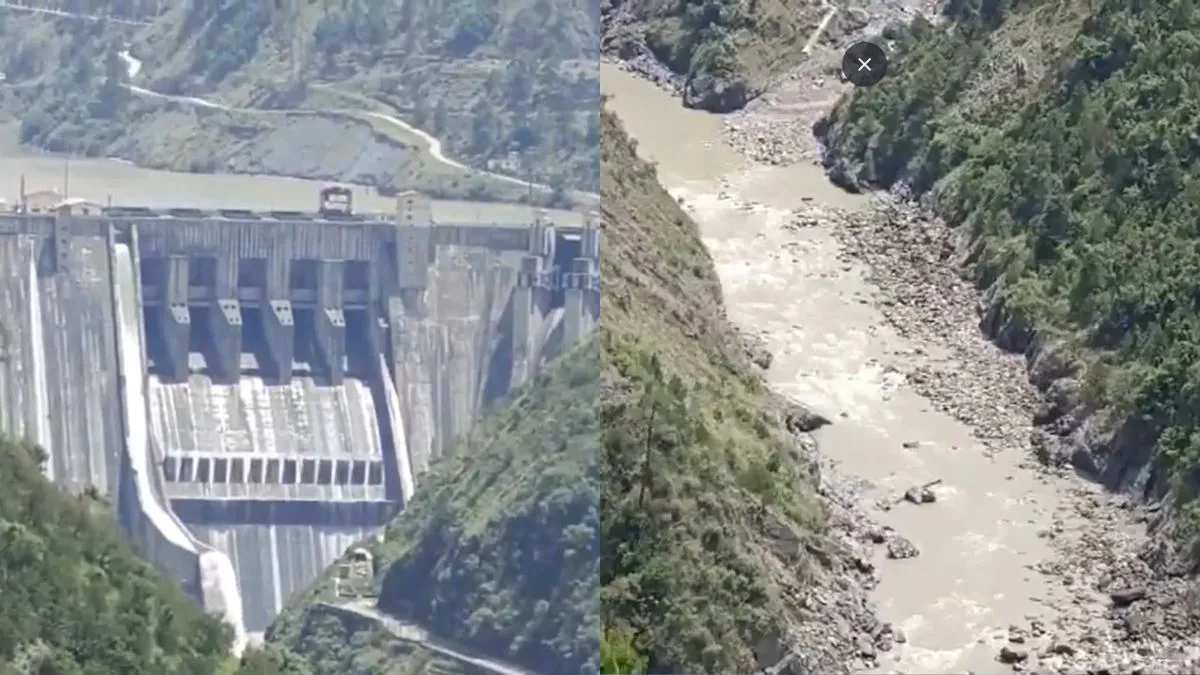- By Talibuddin Khan
- Tue, 13 May 2025 03:24 PM (IST)
- Source:JND
India-Pakistan Tensions: A day after Prime Minister Narendra Modi warned Pakistan that "blood and water cannot flow together", all gates at the Baglihar Hydroelectric Power Project Dam, built on the Chenab River in Jammu and Kashmir's Ramban, have been closed by Indian authorities. Hitting out at Pakistan over its support to cross-border terrorism, PM Modi said "terror and talks" and "terror and trade" cannot go together, warning Pakistan that a "befitting reply" is now India's policy against terrorism.
#WATCH | Jammu and Kashmir | All gates at the Baglihar Hydroelectric Power Project Dam, built on the Chenab River in Ramban, have been closed.
— ANI (@ANI) May 13, 2025
(Visuals from the spot, shot at 12:45 pm) pic.twitter.com/4BTvjgowd9
"If there are talks with Pakistan, it will be only on terrorism and vacating Pakistan-occupied Kashmir which is under its illegal occupation," the prime minister said in his first address to the nation after India's Operation Sindoor against Pakistan-based terror groups and their bases.
ALSO READ: Pakistan Loses Cyber Warfare Against India: Hackers Made 15 Lakh Attempts, Only 150 Successful
Two gates of the Baglihar dam were reportedly opened on Sunday from 8:30 am till 4:30 pm, after heavy rains lashed the region on Friday, swelling the river and triggering a flood-like situation, which prompted the authorities to regulate the water flow. The Baglihar dam, with a 900 MW capacity, is a key hydroelectric project in India.
VIDEO | Jammu and Kashmir: Several gates of Baglihar Dam, built on Chenab river in Ramban, were seen open this morning. #BagliharDam #chenab pic.twitter.com/cN3lQZwD5B
— Press Trust of India (@PTI_News) May 11, 2025
India, earlier last month, suspended the Indus Waters Treaty with Pakistan in a stern and decisive action following the ghastly terror attack in Pahalgam, which resulted in the death of 26 tourists in the Baisaran Valley. The treaty was suspended until Pakistan credibly and irrevocably abjures its support for cross-border terrorism.
India also categorically denied discussing any change in the suspension of the Indus Waters Treaty with Pakistan during the DGMO-level talks regarding the ceasefire of all military confrontations between the two neighbouring nations following India's Operation Sindoor against Pakistan-based terror groups and their hideouts.
"The Indus Water Treaty will stay in abeyance. The DGMO-level talks have to go forward. Operation Sindoor is still on. Non-Kinetic measures stay in place. Kinetic measures are options we will exercise if Pakistan makes any moves to send drones or missiles or any other form of aggression. Pakistan violated the preamble of the Indus Treaty, which says it is being done with goodwill and good neighbourliness," news agency ANI quoted government sources as saying.
The Indus Water Treaty, signed in 1960, governs the sharing of waters between India and Pakistan. India's decision to keep the treaty in abeyance reflects the strained relations between the two countries.
ALSO READ: PM Modi Meets Air Force Jawans At Adampur Air Base In Punjab Amid India-Pakistan Tensions | In Pics
The Treaty allocates the Western Rivers (Indus, Jhelum, Chenab) to Pakistan and the Eastern Rivers (Ravi, Beas, Sutlej) to India. At the same time, the Treaty allows each country certain waters of the rivers allocated to the other. The treaty gives India 20 per cent of the water from the Indus River System and the rest 80 per cent to Pakistan.

